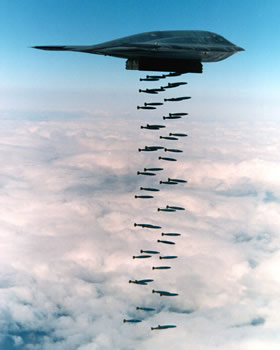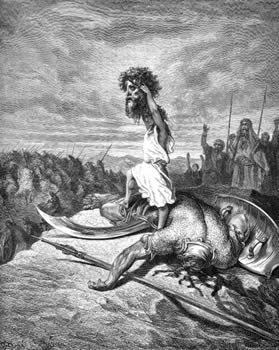I'm Already Against the Next War:
War and Violence, Sacred and Secular
For Sunday July 1, 2012
Lectionary Readings (Revised Common Lectionary, Year B)
2 Samuel 1:1, 17–27 or Wisdom of Solomon 1:13–15; 2:23–24
Psalm 130 or Psalm 30 or Lamentations 3:23–33
2 Corinthians 8:7–15
Mark 5:21–43
The fourth of July will see many jet fly-overs at parades and baseball games. I find these displays of military might technologically awesome but morally repulsive.
The year 2012 started badly for the American military. In January, an internet video surfaced showing four Marines joking as they urinated on Afghan corpses. In February, soldiers burned Muslim holy books in a garbage dump at Bagram Air Field; the ensuing riots killed thirty people. In March, an Army staff sergeant massacred seventeen civilians in two Afghan villages, including nine children. Then in April, the LA Times published two of eighteen photos that it received from an anonymous American soldier showing US troops mugging for the camera as they posed with the body parts of dead Afghan soldiers.
 |
B-2 Stealth Bomber. |
When you consider that 2.3 million Americans have fought in Iraq and Afghanistan for more than ten years, it's easy to interpret these gruesome incidents as rare exceptions. But it's also easy to imagine, as Yale's chaplain William Sloan Coffin put it, that "war turns some boys into men; and it turns others into animals."
In fact, David Livingstone Smith argues in his book The Most Dangerous Animal; Human Nature and the Origins of War that war isn't a consequence of nurture, a learned behavior, or a mere "cultural artifact." Rather, he argues that war is deeply embedded in human nature, that it's innate, and our natural impulse. As such, war is not a pathology or aberrant choice, it's "a normal feature of human life." I hope he's wrong.
The secular violence of modern war has its sacred counterparts in ancient Scripture. In the Old Testament reading this week, David laments the death of Saul, who was killed by God because he spared king Agag: "The next day, when the Philistines came to strip the dead, they found Saul and his three sons fallen on Mount Gilboa. They cut off his head and stripped off his armor, and they sent messengers throughout the land of the Philistines to proclaim the news in the temple of their idols and among their people. They put his armor in the temple of the Ashtoreths and fastened his [decapitated] body to the wall of Beth Shan" (1 Samuel 31:8–10; cf. 1 Chronicles 10:10).
In last week's reading, David taunted the Philistines after beheading Goliath. Now the tables were turned, and the oppressed became the new oppressor. As for king Agag, Samuel made amends for Saul's mercy and "hewed him to pieces." Today we'd call these three examples war crimes or crimes against humanity.
The mutilation of Agag, Saul and Goliath reminded me of an interview with journalist Chris Hedges, who recalled what he witnessed in twenty years as a war correspondent. His war narrative is separated from Saul's by 3,000 years, but the two accounts are eerily similar. In war, says Hedges, "routine death becomes boring. It's why you would go into central Bosnia and see bodies crucified on the sides of barns, or why in El Salvador genitals were stuffed in people's faces — mutilation, you know, the body as sort of trophy, the body as a kind of performance art."1
 |
The Death of King Saul by Elie Marcuse (1817–1902). |
Nailing Saul's beheaded corpse to the wall of a Philistine temple, and the bodies of young soldiers to Bosnian barns, are horrific reminders of the true nature of war, whether ancient or modern. They belie the sanitized sound bites of embedded reporters or the patriotic propaganda of government spokes people. So do My Lai (1968), dragging dead American soldiers through the streets of Mogadishu (1993), torturing prisoners in Abu Ghraib (2003), hanging the charred bodies of American soldiers from a bridge over the Euphrates River (2004), and murdering two dozen civilians in Haditha (2005).
Hedges characterizes such desecrations as "an inevitable consequence of war." They peel back the rhetorical veneer of war to reveal its true nature as "almost pure sin."
To learn what real war is like, says Hedges, listen to the losers. The vanquished are better guides than the victors:
They see through the empty jingoism of those who use the abstract words of glory, honor, and patriotism to mask the cries of the wounded, the senseless killing, war profiteering, and chest-pounding grief. They know the lies the victors often do not acknowledge, the lies covered up in stately war memorials and mythic war narratives, filled with stories of courage and comradeship. They know the lies that permeate the thick, self-important memoirs by amoral statesmen who make wars but do not know war. The vanquished know the essence of war — death. They grasp that war is necrophilia. They see that war is a state of almost pure sin with its goals of hatred and destruction. They know how war fosters alienation, leads inevitably to nihilism, and is a turning away from the sanctity and preservation of life. All other narratives about war too easily fall prey to the allure and seductiveness of violence, as well as the attraction of the godlike power that comes with the license to kill with impunity.Ma2
But in a spiral of violence begetting violence, the oppressed often becomes the new oppressor. The losers savor their bitter memories of the past in hopes of revenge in the future. This is why Slobodan Milosevic's war rhetoric reached back to Serbia's humiliation by the Ottomans at the Battle of Kosovo in 1389.
When David learned of Saul's death, he executed the messenger who brought the news. Mind you, Saul had conscripted Israel's children for wars, made them domestic slaves, confiscated their land, and levied exorbitant taxes. He was a war president: "All the days of Saul there was bitter war with the Philistines." He was also a war profiteer who after defeating the Amalekites took for himself "the best of the sheep and cattle, the fat calves and lambs — everything that was good," all under the pretext of religious piety (1 Samuel 14:52, 15:9). Saul also "set up a monument in his own honor" (15:12).
Instead of waging peace, David lamented the death of Saul and the demise of Israel's military might: "How the mighty have fallen / the weapons of war have perished!" (2 Samuel 1:27). Perhaps lamenting the demise of military violence was predictable for a king who was himself called "a man of war" (1 Chronicles 28:3).
Some wars are necessary, even unavoidable. Even Hedges admits that some wars are a "moral imperative." The gist of Samantha Power's 2003 Pulitzer Prize book A Problem from Hell is precisely that — the moral failure of America to intervene in genocides in places like Bosnia, Rwanda or Darfur. When we lived in Moscow (1991–1995), Russian war veterans in their seventies would smile and grab our hands as we waited at a metro station, thanking America for what we did in World War II — "we were allies against Hitler!"
But war as a regrettable last resort, when every eligible citizen-soldier does his/her part, is different than the unilateral and pre-emptive use of military force, when waged by the proxy of a professional army and as a de facto tool of diplomacy. Today less than one percent of the American population serves in the military.
 |
David beheads Goliath by Gustav Dore (1832-1883). |
Andrew Bacevich laments "the new American militarism." Our military idolatry, says Bacevich, is now so comprehensive and beguiling that it "pervades our national consciousness and perverts our national policies." We have normalized war, romanticized military life that formally was deemed degrading and inhuman, measured our national greatness in terms of military superiority, and harbored naive, unlimited expectations about how waging war, long considered a tragic last resort that signaled failure, can further our national self-interests. Utilizing a "military metaphysic" to justify our misguided ambitions to recreate the world in our own image, with ideals that we imagine are universal, has taken about thirty years to emerge in its present form. It is a problem not merely of the government or of any single administration, says Bacevich, but of American society at large.
Many of the earliest Christians repudiated the violence of war, military service, and even the state itself. For two dozen examples, click here. Origen of Alexandria (185–254 AD), perhaps Christianity's greatest early scholar, is representative. In his book Against Celsus, Book VIII, Chap. 73, he writes:
And as we — by our prayers —
vanquish all the demons that stir up war,
and lead to the violation of oaths,
and disturb the peace,
we in this service
are much more helpful to the kings
than those who go into the field
to fight for them.And we do take our part in public affairs,
when along with righteous prayers,
we practice self-denying disciplines and meditations,
which teach us to despise pleasures,
and not to be lead astray by them.
And none fight better for the king
[and his role of preserving justice]
than we do.
We do not indeed fight under him,
although he demands it;
but we fight on his behalf,
forming a special army of piety
by offering our prayers to God.
Of course, good Roman citizens considered Origen's words seditious. Things changed radically when Constantine became emperor and ordered Christian emblems on shields and helmets. But his celebration of war and exploitation of the faith was not always the status quo, and it need not be so today.
For further reflection:* In his work on sacred violence, Rene Girard of Stanford argues that "the Bible is the first text to represent victimization from the standpoint of the victim, and it is this representation which is responsible, ultimately, for our own superior sensibility to violence. … It is for biblical reasons, paradoxically, that we criticize the Bible."
* What are the implications of the fact that 70–90% of war deaths are civilian?
* Would we think differently about militarism if we had compulsory conscription?
* How do we honor the sacrifices made by our soldiers while dissenting from militaristic ideology?
* See Chris Hedges, War is a Force That Gives Us Meaning; Stephen Kinzer, Overthrow: America's Century of Regime Change from Hawaii to Iraq; Drew Gilpin Faust, This Republic of Suffering; Death and the American Civil War; and Philip Jenkins, Laying Down the Sword; Why We Can't Ignore the Bible's Violent Verses (2011).
[1] Religion and Ethics Newsweekly, January 31, 2003 Episode no. 622. See http://www.pbs.org/wnet/religionandethics/week622/hedges.html
[2] New York Review of Books, December 16, 2004.
Image credits: (1) Wikipedia.org; (2) Wikipedia.org; and (3) Wikipedia.org.





